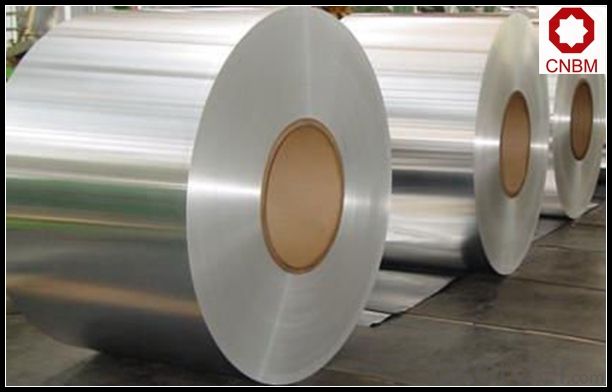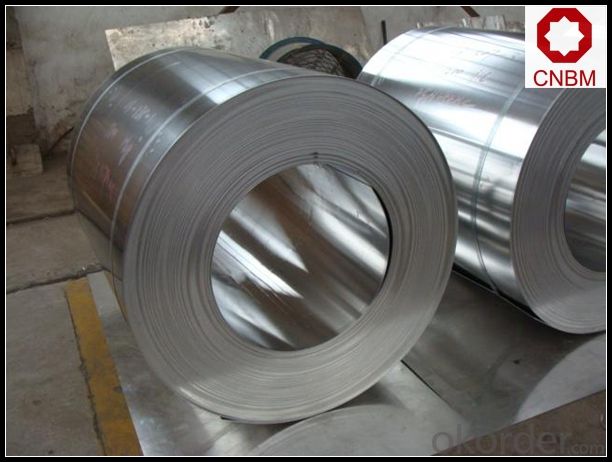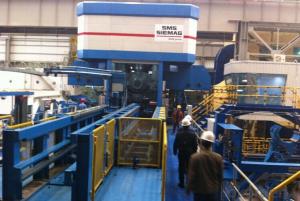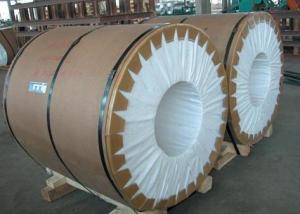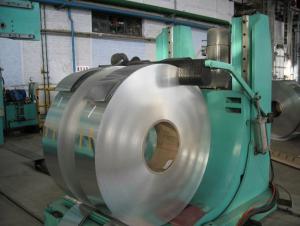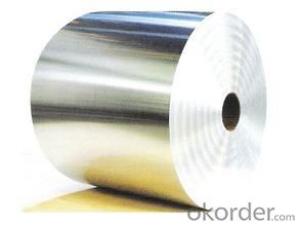Aluminum Foil Coil Stock in Large Quantity
- Loading Port:
- Shanghai
- Payment Terms:
- TT OR LC
- Min Order Qty:
- 5 m.t.
- Supply Capability:
- 10000 m.t./month
OKorder Service Pledge
OKorder Financial Service
You Might Also Like
Specification
1. Specification of Aluminum Foil Coil Stock in Large Quantity
1) Alloy | 1050, 1060,1100, 3003 3004 3105 3A21 5005 5052 etc |
2) Temper | O/H12/H14/H1/H18/H32/H34/H36/H38//H111/H112/H116/H321/T6/T651/T3/T351 etc |
3) Thickness | 0.1mm to 6mm |
4) Width | 20mm to 3300mm |
5) Coil weight | 100kgs to 6 tons depends on actual requirement |
6) Core material | Aluminum or paper |
7) Coil Inner diameter | 75mm, 150mm, 200mm, 300mm, 405mm, 505mm or as required |
8) Protective film can be added
2. Application of Aluminum Foil Coil Stock in Large Quantity
(1).Interior: wall cladding, ceilings, bathrooms, kitchens and balconies, shutters, doors...
(2).Exterior: wall cladding, facades, roofing, canopies, tunnels,column covers , renovations...
(3).Advertisement: display platforms, signboards, fascia, shop fronts...
3. Feature of Aluminum Foil Coil Stock in Large Quantity
*Such coil is specially designed to replace aluminum ingot, due to the high export tax of aluminum ingot, the coil has better price than ingot.
*This type of coil can fit customer's remelting furnace just like ingot, no need to make any change to the production line that was previously used for ingot. The standard coil size and weight is very suitable for the feed gate of furnace.
*This type of coil causes less material wastage than ingot when remelted.
*Our coil is made directly from ore, no need to go though the ingot making process, quality is much better than other suppliers who use ingot scrap to make coil.
Be free from Oil Stain, Dent, Inclusion, Scratches, Stain, Oxide Dicoloration, Breaks, Corrosion, Roll Marks, Dirt Streaks and other defect which will interfere with use
4. Certificate:
SGS and ROHS(if client request, paid by client), MTC(plant provided), Certificate of Origin(FORM A, FORM E, CO), Bureau Veritas and SGS (if client request, paid by client), CIQS certificate
5. Image of Aluminum Foil Coil Stock in Large Quantity
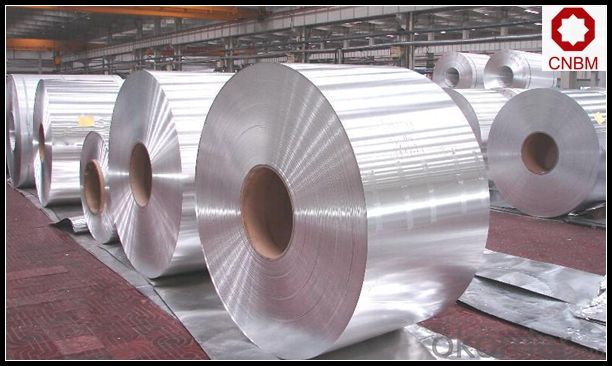
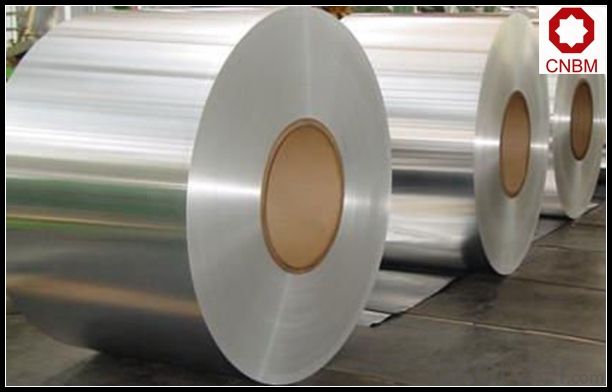
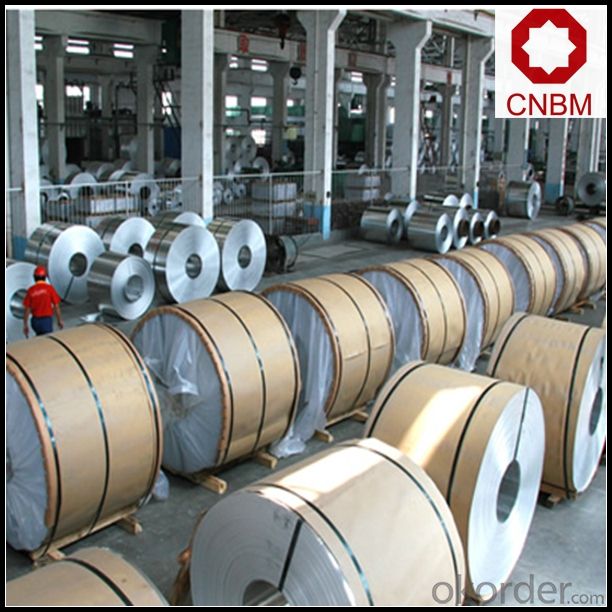
6. Package and shipping of Aluminum Foil Coil Stock in Large Quantity
eye to wall
eye to the wall
with wood pallet (wooded case also available)
7. FAQ of
1) What is the delivery time?
Dpends on actual order, around 20 to 35 days
2)What is the QC system:
We have QC staff of 20 persons and advanced equipment, each production is with MTC traced from Aluminum ingot lot.
3) What market do you mainly sell to?
Australia, America, Asia, Middle East, Western Europe, Africa etc
- Q: What are some common types of aluminum coils used in various industrial applications?
- <p>Yes, there are several types of aluminum coils commonly used in industry. These include: 1) Plain aluminum coils, which are used in packaging and construction. 2) Embossed aluminum coils, utilized for decorative purposes and in the automotive industry. 3) Painted aluminum coils, often used in building materials and appliances. 4) Galvanized aluminum coils, which are corrosion-resistant and used in exterior applications. 5) Heat-treated aluminum coils, known for their strength and used in aerospace and automotive parts. Each type serves specific purposes based on the properties of the aluminum and the coatings or treatments applied.</p>
- Q: How are aluminum coils cleaned and maintained?
- Aluminum coils are commonly used in HVAC systems and refrigeration units, and it is essential to clean and maintain them regularly to ensure optimal performance and efficiency. Here is a step-by-step guide on how to clean and maintain aluminum coils: 1. Safety first: Before starting any cleaning process, ensure that the power to the HVAC system or refrigeration unit is turned off to avoid any accidents. 2. Remove debris: Begin by removing any visible debris, such as leaves, dirt, or dust, from the aluminum coils. Use a soft brush or a vacuum cleaner with a brush attachment to gently remove the debris. 3. Spray cleaning solution: Prepare a cleaning solution by mixing a mild detergent or coil cleaner with water. Follow the instructions on the product label to achieve the correct dilution ratio. Transfer the solution into a spray bottle. 4. Apply the cleaning solution: Spray the cleaning solution onto the aluminum coils, ensuring that all areas are covered. Allow the solution to sit for a few minutes to loosen any dirt or grime. 5. Scrub the coils: Use a soft brush or a coil cleaning brush to scrub the aluminum coils gently. Be cautious not to apply excessive pressure, as it may damage the delicate fins on the coils. Focus on areas with stubborn dirt or buildup. 6. Rinse with water: After scrubbing, rinse the aluminum coils thoroughly with clean water. A hose or a pressure washer on a low setting can be used to ensure all the cleaning solution and dirt are removed. Ensure that the water flows in the opposite direction of the airflow to avoid pushing debris further into the coils. 7. Check for any damage: While cleaning, inspect the aluminum coils for any signs of damage, such as bent fins or leaks. If any issues are found, it is recommended to contact a professional technician for repairs. 8. Allow to dry completely: After rinsing, allow the aluminum coils to air dry completely before turning the power back on. This will prevent any moisture-related issues and ensure the coils are ready for use. 9. Maintain a regular cleaning schedule: To keep the aluminum coils in excellent condition, it is crucial to establish a regular cleaning schedule. Depending on the usage and environmental factors, cleaning every three to six months is generally recommended. However, if the coils are installed in a highly polluted or dusty area, more frequent cleaning may be required. By following these steps and maintaining a regular cleaning schedule, you can ensure that your aluminum coils remain clean, efficient, and in optimal working condition.
- Q: Are there any specific regulations for the disposal of aluminum coil waste?
- Yes, there are specific regulations for the disposal of aluminum coil waste. The disposal of aluminum coil waste is subject to various environmental regulations to ensure proper handling and prevent any potential harm to the environment and human health. One of the key regulations is the Resource Conservation and Recovery Act (RCRA) in the United States. Under this act, aluminum coil waste is considered a hazardous waste if it exhibits certain characteristics such as ignitability, corrosivity, reactivity, or toxicity. If the waste meets these criteria, it must be managed as hazardous waste and disposed of in accordance with RCRA regulations. This may involve treatment, storage, and disposal at an approved hazardous waste facility. Additionally, the Environmental Protection Agency (EPA) has established guidelines for the disposal of non-hazardous aluminum coil waste. These guidelines typically require proper storage, labeling, and transportation of the waste to an authorized disposal facility. The disposal facility should be equipped to handle and process the waste in an environmentally responsible manner. In many countries, including the United States, local, state, and federal regulations may also apply to the disposal of aluminum coil waste. These regulations may vary depending on the specific location and the nature of the waste. It is crucial for businesses and individuals involved in the disposal of aluminum coil waste to familiarize themselves with the applicable regulations to ensure compliance and avoid potential penalties. Overall, it is important to follow the specific regulations for the disposal of aluminum coil waste to protect the environment, prevent pollution, and ensure the safety of individuals involved in waste management.
- Q: why is aluminum to the right side of the periodic table if it's a metal and why is it negatively charge if it's a mental. also if you combine it with like another metal will it be an ion since its positively charge or no because they are both metals
- It okorder /
- Q: How are aluminum coils protected against oxidation during storage?
- There are various methods used to protect aluminum coils against oxidation during storage. One commonly used approach involves applying a protective coating to the surface of the coils. This coating creates a barrier that prevents oxygen from coming into contact with the aluminum and causing oxidation. The coating may consist of a thin layer of oil or a specialized protective film. Another method involves storing the coils in a controlled environment with low humidity. This is because moisture in the air can accelerate the oxidation process. By keeping the coils in a dry environment, the risk of oxidation can be reduced. Furthermore, aluminum coils can be stored in airtight packaging, such as plastic wraps or vacuum-sealed bags. This further minimizes exposure to oxygen, thereby preventing oxidation. It is crucial to handle the coils with care during storage to avoid any damage that could potentially expose the aluminum to the air. Proper packaging and stacking techniques are essential to ensure that the coils remain protected. In conclusion, a combination of protective coatings, controlled environments, and proper handling techniques are employed to safeguard aluminum coils against oxidation during storage.
- Q: What are the different mechanical properties of aluminum coils?
- Aluminum coils possess various mechanical properties that make them highly desirable for a wide range of applications. Some of the key mechanical properties of aluminum coils include: 1. Strength: Aluminum coils exhibit impressive strength, making them suitable for structural applications. The strength of aluminum can be further enhanced through alloying or heat treatment processes. 2. Ductility: Aluminum coils are highly ductile, allowing for easy forming and shaping. This property enables the production of complex shapes and intricate designs without compromising the material's integrity. 3. Lightweight: Aluminum is renowned for its low density, making it one of the lightest metals available. This property makes aluminum coils ideal for applications where weight reduction is crucial, such as in aerospace and automotive industries. 4. Corrosion resistance: Aluminum has natural corrosion resistance, forming a protective oxide layer that prevents further oxidation. This property makes aluminum coils suitable for outdoor and marine environments, as they can withstand harsh conditions and reduce maintenance requirements. 5. Conductivity: Aluminum is an excellent conductor of both heat and electricity. This property makes aluminum coils ideal for applications that require efficient heat transfer, such as in heat exchangers and electrical wiring. 6. Machinability: Aluminum coils are relatively easy to machine due to their low melting point and excellent chip formation. This property allows for high-speed machining operations, resulting in reduced production time and costs. 7. Weldability: Aluminum coils can be easily welded using various techniques, such as TIG (Tungsten Inert Gas) or MIG (Metal Inert Gas) welding. This property enables the fabrication of complex structures and the joining of aluminum components. 8. Fatigue resistance: Aluminum exhibits excellent fatigue resistance, allowing it to withstand repeated stress cycles without failure. This property makes aluminum coils suitable for applications subjected to cyclic loading, such as in automotive components or structures exposed to wind or waves. Overall, the unique combination of mechanical properties possessed by aluminum coils, including strength, ductility, lightweight, corrosion resistance, conductivity, machinability, weldability, and fatigue resistance, makes them a versatile material choice for a wide range of industries and applications.
- Q: What specific tools are required for handling and working with aluminum coils?
- <p>Working with aluminum coil typically requires specialized tools to ensure safety and efficiency. Essential tools include a coil cutter for precise cutting, a coil car for easy transportation, and a decoiler for unrolling the coil. Additionally, protective gloves and safety glasses are crucial for personal protection. For more complex tasks, a shear machine or press brake may be necessary for shaping the aluminum. Always follow safety guidelines and use the appropriate tools for the job to prevent accidents and ensure quality work.</p>
- Q: Can aluminum coils be used in the production of electronic components?
- Indeed, electronic components can utilize aluminum coils in their production. Aluminum, a highly versatile and extensively employed metal across diverse industries, including electronics, harbors numerous benefits. Notably, it possesses a lightweight nature, exceptional thermal conductivity, resistance to corrosion, and superb electrical conductivity. These remarkable properties render aluminum coils fitting for deployment in electronic components, encompassing capacitors, transformers, inductors, and heat sinks. By incorporating aluminum coils in electronic components, the dissipation of heat becomes more efficient, performance is enhanced, and the overall weight of electronic devices is reduced.
- Q: What are the precautions to be taken while handling aluminum coils?
- Some precautions to be taken while handling aluminum coils include wearing protective gloves to prevent cuts or injuries, using proper lifting techniques to avoid strain or back injuries, storing coils in a dry and well-ventilated area to prevent corrosion, using appropriate equipment and tools for handling and transportation, and following safety guidelines provided by the manufacturer. It is also important to be aware of the weight and balance of the coils to prevent accidents or damage.
- Q: Are aluminum coils resistant to chemical exposure?
- Aluminum coils are widely recognized for their high resistance to chemical exposure. Aluminum itself possesses exceptional corrosion resistance properties, making it suitable for a variety of applications where it may encounter chemicals. The naturally occurring oxide layer on aluminum coil surfaces acts as a safeguard, preventing further corrosion and deterioration when exposed to numerous chemicals. Nevertheless, it is important to acknowledge that the chemical resistance of aluminum coils can vary depending on the specific type and concentration of the chemical involved. Certain aggressive chemicals or potent acids may still result in damage or corrosion over time. Therefore, it is always recommended to seek advice from experts or refer to specific chemical compatibility charts in order to determine the compatibility of aluminum coils with particular chemicals or environments.
Send your message to us
Aluminum Foil Coil Stock in Large Quantity
- Loading Port:
- Shanghai
- Payment Terms:
- TT OR LC
- Min Order Qty:
- 5 m.t.
- Supply Capability:
- 10000 m.t./month
OKorder Service Pledge
OKorder Financial Service
Similar products
Hot products
Hot Searches
Related keywords


